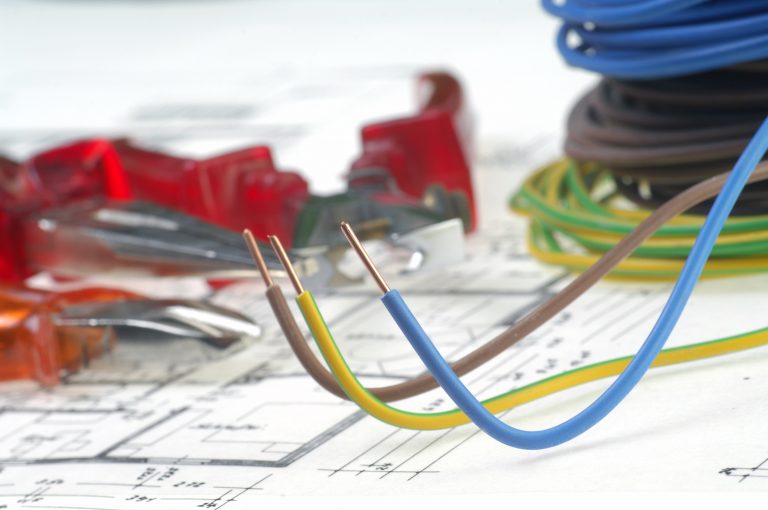House rewire in Edinburgh

Electrical regulations and technologies are constantly evolving.
Book a quote for a house rewire in Edinburgh by an accredited Electrician.
Call us on 0131 315 0000.
Or read on to find out:
- What is involved in a rewire
- Signs that your property might need a rewire
- Potential costs of a house rewire in Edinburgh
- Costs to budget for beside the electrical work
- One (or more) vital pieces of information
What is a rewire?
In simple terms, and as the word suggests, a house rewire involves replacing part, or all, of the electrical installation / wiring in a property.
- Replacing fuse boards
- Running new wiring to lights, sockets and switches
- Moving and adding sockets to meet current regulations and modern requirements
- Upgrading cabling to take advantage of improved technologies
A complete rewire of a property is a large undertaking however, it will make a property safer as well as making sockets, switches and lights more “useable”.
Why might a property need a rewire?
- Use-ability: The demands of a house’s electrical installation have changed from, say, 30 years ago. In the past sockets, lights and switches were positioned to accommodate lamps, electric heaters and a single plug for the TV. Technology has moved on. Now home entertainment systems, wall mounted TV’s, more powerful electric showers, home offices, a plethora of kitchen appliances and USB charging points make quite different demands on a properties electrical systems.
- Regulatory changes: Regulations and best practice for home electrical wiring is updating all the time. A rewire will accommodate these changes.
- Safety: Perhaps most important of all, in particular for older Edinburgh properties. Substandard or overloaded electrical installations cause around 8,000 fires each year in the UK. Quite simply, a new electrical installation, done to current regulatory standards, is safer than one that was at the cutting edge of technology 30 years ago.
- Running cost reductions / improving energy efficiency: Installing energy efficient lighting (LEDs) and smart controls as part of a rewire will lead to lower electricity consumption (lower bills).
How can one tell if a property needs a rewire?
There are many tell tale signs that it might be time to consult a qualified electrician to discuss a rewire:
- Obvious damage around sockets, switches and lights.
- Round pin holes in sockets means a very old installation.
- Tripping / blowing fuses / circuit breakers.
- Lights briefly flickering when turned on.
- Dimming of lights when other appliances are switched on (for example Electric Showers or ovens).
- Sparks or blue flashes when switches are turned on or off.
- Extensive use of adaptors, multiple extension cables or frequently having to unplug one appliance to make way for another.
- A fishy or chemical smell coming from a plug socket or really when any electrical appliance is being used.
- Re-wireable fuseboards
- Wires that are coloured black and red rather than green, brown and blue
- Wooden backings to light switches or even the fuse board
- The plastic protective sheath around wiring cracking, crumbling or appearing dried out.
The presence of these indicators may not necessarily mean that a full rewire is essential but it may be worth consulting with a qualified electrician. By spending around an hour an electrician will be able to tell you whether a house rewire would be advisable. A more detailed check or even an EICR might still be advisable to identify if, for example, only a partial rewire were required or where there are specific failings.
What does a rewire involve?
Rewiring of a property is disruptive. It can require lifting of flooring & floor boards, cutting channels into walls or ceilings to run cables and moving sockets from skirting boards onto walls.
For this reason we recommend that homeowners do any rewiring before any aesthetic work such as a new bathrooms or kitchens and in particular before any decoration.
A rewire might not result in the replacement of every piece of cable, every switch and every socket. It will, however, most probably involve a new fuseboard, creation of new circuits and new cables run to a large proportion of sockets, switches and lights as well as replacement of the sockets, switches and light fittings.
What does a house rewire in Edinburgh cost?
When budgeting for a rewire be aware that the costs of lifting and replacing flooring, re-plastering and re-decorating can be as much or more than the rewire itself.
To give an indication of the cost for a house rewire in Edinburgh is not easy due to the number of variables that can affect price:
- Size of property and number of rooms
- Construction of the property and so the ease with which new cables can be run
- How advanced a system is to be installed
- Whether you would be prepared to use conduit to hide cable rather than bury it in the walls
- The materials that the electrician doing the rewiring is going to use (They can vary widely in price and quality)
- How many sockets switches and fixtures and fittings are needed.
- And so on…
However, to give some indication a look around the web shows one site claiming an average cost of a rewire being £3,500. Another site says between £2,500 and £4,500 and a third site £2,500 to £6,000.
Three recent house rewires in Edinburgh carried out by HomeForce electrician’s have cost £3,400 for a five bedroom property in EH5, £1,800 for a one bed property in Leith, EH6 and a partial rewire in EH4 coming in at £2,200. Note that these are costs for the electrical work only.
A final piece of advice – GET A COMPLETION CERTIFICATE
When a rewire is completed ensure you receive a completion certificate from the electrician who carries out the house rewire. Make it a condition that they will only receive final payment once the completion certificate has been given to you. This certificate shows that the system is installed to current regulatory / safety standards and has been properly tested.
You will need it for any building warrant approval and also when you come to sell your house.
At HomeForce we are quite regularly contacted by customers asking if an electrician can provide a completion certificate for work done by another, non-HomeForce electrician. The answer is that they can’t. This isn’t because they (or we) want to be unhelpful. It is because in providing a certificate and electrician is putting their name to the work. Few people will stake their professional livelihood on the work of someone they don’t know. The work could be incorrectly & so dangerously installed and it is the person named on the certificate who would be held liable.
What can be done in these circumstances is conduct an Electrical Installation Condition Report (EICR). Provided the results are satisfactory the EICR will usually be sufficient for a council inspector to sign off a building warrant and for a home owner to be comfortable that their property is safe.
Book quote for a house rewire in Edinburgh now:
- Complete our Tradesperson Booking Form
- Tel: – 0131 315 0000
- Email: – info@homeforce.co.uk



